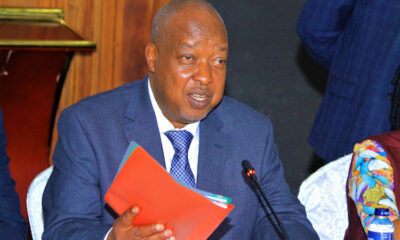In 2018, the Motorcycle Assemblers Association of Kenya reported that during the 2016/2017 financial year, the boda-boda (commercial motorcycles) sector in Kenya earned Sh219 billion, surpassing Safaricom’s 2017 revenue by Sh7 billion.
To many, this was impossible. However, this information suggested that those at the bottom can be key stakeholders in a country’s economy.
Kenya’s independence struggle was largely premised on the idea that uhuru (freedom) meant Kenyans would own their economy; thereby freeing themselves from disease, poverty and illiteracy, hence guaranteeing political inclusion, social justice and equal opportunities.
Generally, since independence, successive governments have managed the economy in such a way that reasonable annual growth rates are achieved. However, regrettably the growth is not equitably shared.
Despite the partial opening of society from 2002 and the advent of devolution in 2013, marginalisation of regions and communities continue to thrive.
Inequalities in terms of incomes and opportunities became rampant. Conspicuous consumption by the rich co-existed with extreme poverty.
Indicators of instability started to take root in society with clear symptoms being a disgruntled working class, an expanding pool of educated but unemployed youth, persistent group grievances (as exemplified by Mungiki, Mombasa Republican Council and so on), ethnic conflicts, weak public institutions, decline in public morality, endemic looting of public resources, among others.
So then, why has devolution and expanding economic growth not delivered the desired economic Canaan? The bottom line question is: “What do we still need to do differently?”
The answer is likely to be found in expanding and entrenching the ownership of the economy so that the citizens become the principal players and not extras.
This requires that the governance and management of the economy shifts from a purely capitalistic, individualistic and exploitative approach to a more inclusive approach.
Since the benefits of economic growth accrue to those who own the productive resources, what needs to happen so that the ordinary citizen shares in ownership of these resources?
Several suggestions need to be considered. First, creating a libertarian approach whereby all citizens have opportunities to achieve economic success through eradication of the current network approach whereby opportunities are available depending on connections and insider information exploitation.
This calls for deliberate efforts to create a sense of guaranteed equity!
Second, focusing attention on equal access to education and healthcare, enhanced security and social protection and increased availability of gainful employment of people, land and capital.
The main shift here should be to find a solution to the portfolio of dead capital in Kenya.
The first element is unutilised land. When land is held (probably for speculative purposes) and is not used for production, then the growth of the economy gets impaired. So, the first policy shift should target the issue of land ownership and use.
This requires prescription on zoning and setting of minimum and maximum land holding.
Entitlement to land use should be based on addressing food security and then commercialisation.
Such entitlement should not necessarily be based on the market tenet of ability to buy land, which excludes many Kenyans from land ownership and use.
The other element concerns investing in mortar and stone in terms of non-productive/non-profitable buildings (shops, butcheries, bars, restaurants and kiosks) which litter the country’s urban and roadside landscape.
The government should help create a shift in citizen’s investment psychology from such petty investments to more profitable ones.
Third, the issue of ownership of productive resources, other than land, is key to the attainment of equitable development.
The owners of capital (money) and land are the ones who to a great extent own the Kenyan economy, and get the largest proportion of the benefits of economic growth. That is why inequality is visibly increasing in the country.
Therefore, a mechanism for community-based financial inclusion which enhances savings and access to credit must be developed through which citizens have a greater share of the ownership, governance, management and benefits of financial institutions.
The components of human capital are education and health for all. Therefore, an appropriate combination of universal health cover and formal, vocational, technical, adult literacy and civic education is key to facilitating people to own this factor of production.
Fourth, the growth of the economy is premised on the principle of aggregate demand (National Income) which is composed of consumption, private investments, government spending and net foreign trade.
These elements must be citizen-focused if we wish to achieve inclusive and shared growth.
Moreover, focus on value-adding production of what the citizens consume is a must. There is no need to import what can be produced locally.
Also, it is not prudent for leaders to prioritise foreign investments and development financing while there are enough available local resources for investment.
Fifth, the people’s economy requires that deep democratisation is entrenched. This is citizen participation in production, distribution, governance and decision-making.
It is ownership of the processes and procedures — an endeavour to put the last first; a psychological mechanism to ensure higher productivity based on the realisation that benefits are shared, and a way of nurturing an inclusive development ecosystem.
Reducing minority privilege and class dominance, enhancing collective interest and public morality and encouraging freedoms for everyone are important tenets for achieving a peoples’ economy.
Further, there is need to build communities which have a common purpose to achieve a democratic economy with shared growth, equitable social ownership and entitlements.
Finally, it is necessary to encourage increased and value-adding productivity through promotion of competition, infrastructural developments, improvement in business environment, and formulation of safety nets and redistribution policies.
The writer is Governor of Makueni County.

 Politics1 week ago
Politics1 week ago
 Politics7 days ago
Politics7 days ago
 General News5 days ago
General News5 days ago
 Politics5 days ago
Politics5 days ago
 Politics2 days ago
Politics2 days ago
 Politics4 days ago
Politics4 days ago
 General News2 days ago
General News2 days ago



